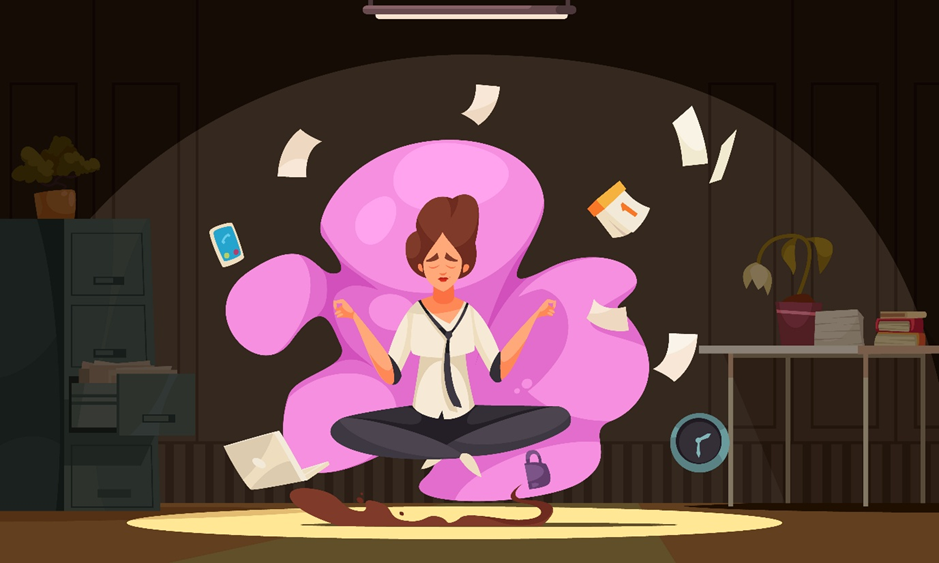Taming the Worry Monster: Your Guide to Managing Anxiety Every Single Day
- Natasha Ololade
- Aug 20, 2025
- 4 min read
Feeling overwhelmed by anxiety? Discover practical, actionable strategies like reframing thoughts, simple relaxation techniques, and easy lifestyle changes to regain control and find calm.
Hey friend!
Anxiety can feel like that uninvited guest who just won't leave. It whispers worries in your ear, makes your heart race, and sometimes even tries to convince you that everything is a crisis. Whether it's a constant hum in the background or surges of intense worry, anxiety can really impact how we experience everyday life.
But here's some good news: you're not powerless against it. Just like you learn to manage other aspects of your life, you can learn to manage anxiety. It's not about making it disappear entirely, sometimes a little anxiety can even be helpful, like when it motivates you to study for a test, but about building a toolkit of strategies that help you cope, calm down, and regain a sense of control. Ready to start building your anxiety-taming arsenal? Let's go!
Understanding the "Why": A Quick Peek at Your Brain's Alarm System
At its core, anxiety is your body's alarm system. It's designed to protect you from danger – the "fight or flight" response. But sometimes, this alarm gets a little too sensitive and starts blaring when there's no real threat – like when you're just thinking about an upcoming presentation, or a pile of laundry. Understanding that your body is just trying to keep you safe can be the first step in not feeling quite so overwhelmed by the physical sensations of anxiety.

Your Toolkit for Calm: Actionable Strategies for Daily Life
Here are some go-to strategies you can start incorporating today:-
1. Cognitive Reframing: Changing Your Narrative
Anxiety often thrives on negative or distorted thought patterns. Cognitive reframing is like putting on a new pair of glasses to see a situation differently. It's about challenging those unhelpful thoughts.
o "Is that a fact or an assumption?" When a worry pops up (e.g., "I'm going to mess up this presentation and everyone will laugh"), ask yourself: "What's the evidence for this? What's the evidence against it?"
o "What's another way to look at this?" Instead of "I'm going to fail," reframe it to "I'm going to do my best, and even if it's not perfect, I'll learn from it."
o "What would I tell a friend?" Often, we're much kinder and more rational with our friends than with ourselves.
2. Relaxation Techniques: Hitting Your Body's "Reset" Button
Anxiety often manifests physically (fast heart rate, shallow breathing, tense muscles). These techniques help counteract that.
o Deep Belly Breathing (Diaphragmatic Breathing): This is gold! When anxious, we tend to breathe shallowly from our chest. Deep breathing signals to your nervous system that you're safe.
Place one hand on your chest and one on your belly.
Breathe in slowly through your nose for a count of 4, feeling your belly rise.
Hold for a count of 4.
Exhale slowly through your mouth for a count of 6-8, feeling your belly fall.
Repeat for 5-10 minutes.
o Progressive Muscle Relaxation (PMR): Tense and then relax different muscle groups in your body, from your toes to your head. This helps you become aware of tension and then consciously release it.
o Mindfulness: Focus on the present moment without judgment. Pay attention to your senses: what do you see, hear, smell, taste, feel right now? This helps pull you out of anxious thoughts about the past or future. Try a guided meditation app if you're new to it.

3. Lifestyle Adjustments: Building a Foundation of Calm
Your daily habits play a huge role in your overall anxiety levels.
o Move Your Body: Regular physical activity (even just a brisk walk) is incredibly effective for reducing anxiety. It burns off excess energy, releases feel-good endorphins, and helps you sleep better. Find something you enjoy!
o Fuel Your Body Well: A balanced diet rich in whole foods, fruits, and vegetables can support brain health. Limit caffeine (it can mimic anxiety symptoms) and excess sugar, which can cause energy crashes and worsen mood.
o Prioritize Sleep: Lack of sleep makes everything feel harder, especially managing anxiety. Aim for 7-9 hours of quality sleep by creating a relaxing bedtime routine.
o Limit "Worry Time": Instead of letting worries consume your whole day, designate a specific 15-30 minute "worry time" each day. If an anxious thought pops up outside that time, acknowledge it and tell yourself, "I'll think about that during my worry time".
o Connect with Others: Humans are social creatures. Spending time with supportive friends, family, or even pets can provide comfort and reduce feelings of isolation.
o Digital Boundaries: Excessive screen time, especially on social media or news apps, can amplify anxiety. Set limits, take digital breaks, and curate your feeds to be more positive.
4. Problem-Solving (When Applicable): Taking Action
Sometimes anxiety stems from real-world problems. While you can't control everything, you can take steps to address things within your power.
o Break down big problems into smaller, manageable steps.
o Focus on what you can control, rather than what you can't.
o Create an action plan, even if it's just one tiny step forward.

In managing anxiety, there will be good days and challenging days, and that's perfectly normal. The key is to be patient and compassionate with yourself, and to consistently practice these strategies. Every deep breath you take, every thought you reframe, and every healthy choice you make is a step towards regaining control and finding more calm in your everyday life. You've got this, and there's a whole community ready to support you.
For further information, check out these resources:
National Institute of Mental Health (NIMH): Offers comprehensive information on anxiety disorders, symptoms, and treatments.
Anxiety & Depression Association of America (ADAA): Provides extensive resources, self-help tools, and a therapist finder.
What's one strategy you're going to try this week to help manage your anxiety? Or, if you already have a go-to trick, share it in the comments below.




Comments